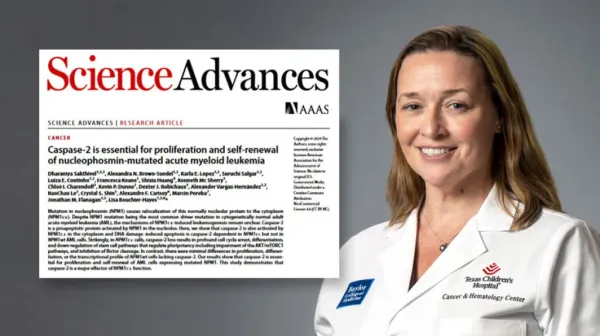Lisa Bouchier-Hayes, PhD
- Cancer and Blood Disorders

Associate Professor, Department of Pediatrics, Division of Hematology-Oncology, Baylor College of Medicine
Office location:
1102 Bates Avenue
Houston, TX 77030
Get to know Lisa Bouchier-Hayes, PhD
Dr. Lisa Bouchier-Hayes is a researcher whose laboratory is focused on investigating the molecular mechanisms of apoptosis and how they impact human health and disease. This focus has evolved to include the investigation of non-apoptotic functions of proteins that have long been considered to have roles in apoptosis, the caspase family of proteases.
Dr. Bouchier-Hayes' research program is focused on two major areas: caspase regulation in cancer and caspase activation during inflammation. The rationale for these investigations is that caspases protect from cancer and other diseases, by engaging diverse cellular mechanisms in addition to cell death, such as cell division, inflammation, and DNA repair.
LEARN MORE ABOUT HER LABORATORY ON BCM.EDU
Education
| School | Education | Degree | Year |
|---|---|---|---|
| St. Jude Children's Research Hospital | Post-doctoral Fellowship | Molecular mechanisms of apoptosis | 2011 |
| LaJolla Institute of Allergy and Immunology | Post-doctoral Fellowship | Molecular mechanisms of apoptosis | 2006 |
| Trinity College, Dublin, Ireland | PhD | Doctor of Philosophy | 2002 |
| Trinity College, Dublin, Ireland | Bachelors | Bachelor of Art, Genetics | 1998 |
Organizations
| Organization Name | Role |
|---|---|
| American Society of Hematology (ASH) | Member |
Honors and awards
- 2022
-
Women of Excellence Award, Baylor College of Medicine
- 2021
-
Health Professions Education Certificate, Texas Children’s Hospital Faculty College
- 2019
-
Young Investigator Award, Department of Pediatrics, Baylor College of Medicine
- 2019
-
Norton Rose Fulbright Faculty Excellence Award for Teaching and Evaluation, Baylor College of Medicine
* Texas Children’s Hospital physicians’ licenses and credentials are reviewed prior to practicing at any of our facilities. Sections titled From the Doctor, Professional Organizations and Publications were provided by the physician’s office and were not verified by Texas Children’s Hospital.
Highlights
Research Area:
Cancer Survivorship


